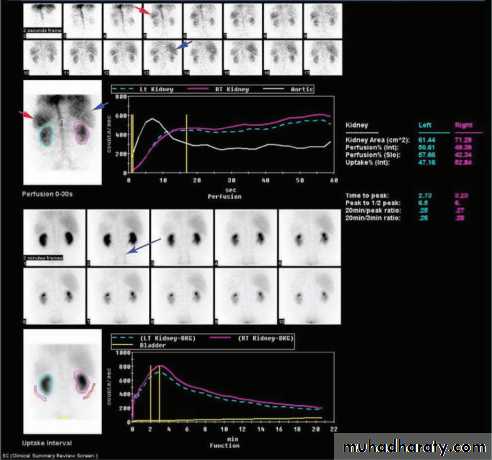Nuclear medicine
Nuclear medicine is a medical specialty involving the application of radioactive substances in the diagnosis and treatment of disease.Diagnostic
In nuclear medicine imaging, radiopharmaceuticals are taken internally, for example, intravenously or orally. Then, external detectors (gamma cameras) capture and form images from the radiation emitted by the radiopharmaceuticals. This process is unlike a diagnostic X-ray, where external radiation is passed through the body to form an image.There are several techniques of diagnostic nuclear medicine.
There are a number of different types of scintigraphy, including bone, pulmonary, cardiac, thyroid , parathyroid & renal .
Renal scintigraphy
Despite advances in US, CT, and MRI, there remain manyareas where scintigraphy remains the easiest, least expensive,and most accurate test. Radiopharmaceuticals are well suitedfor evaluating renal function including blood flow, glomerularfiltration rate (GFR); effective renal plasma flow (ERPF); nephron uptake and clearance; renovascular hypertension/Renal artery stenosis (RAS); acute and chronic renal failure, ischemicnephropathy; pyelonephritis, trauma or surgical complications;renal transplant function, obstruction, and acute or chronicrejection; and ureteral obstruction and vesicoureteral reflux.Radionuclide renal studies are safe, minimally invasive andexpose the patients to radiation doses comparable or less thancompeting radiologic procedures
pictures of the kidneys are taken with a special camera following the injection of a weak radioactive solution (radioisotope), known as Tc DMSA or DTPA
Risks
Because the doses of radiotracer administered are small, diagnostic nuclear medicine procedures result in relatively low radiation exposure to the patient, acceptable for diagnostic exams. Thus, the radiation risk is very low compared with the potential benefits.Allergic reactions to radiopharmaceuticals may occur but are extremely rare and are usually mild. Nevertheless, you should inform the nuclear medicine personnel of any allergies you may have or other problems that may have occurred during a previous nuclear medicine exam.
Injection of the radiotracer may cause slight pain and redness which should rapidly resolve.
limitations
Nuclear renal images cannot reliably differentiate between cysts and tumors.Nuclear medicine procedures can be time-consuming. You will be informed as to how often and when you will need to return to the nuclear medicine department for further procedures.
The resolution of structures of the body with nuclear medicine may not be as clear as with other imaging techniques, such as CT or MRI. However, nuclear medicine scans are more sensitive than other techniques for a variety of indications, and the functional information gained from nuclear medicine exams is often unobtainable by any other imaging techniques.

